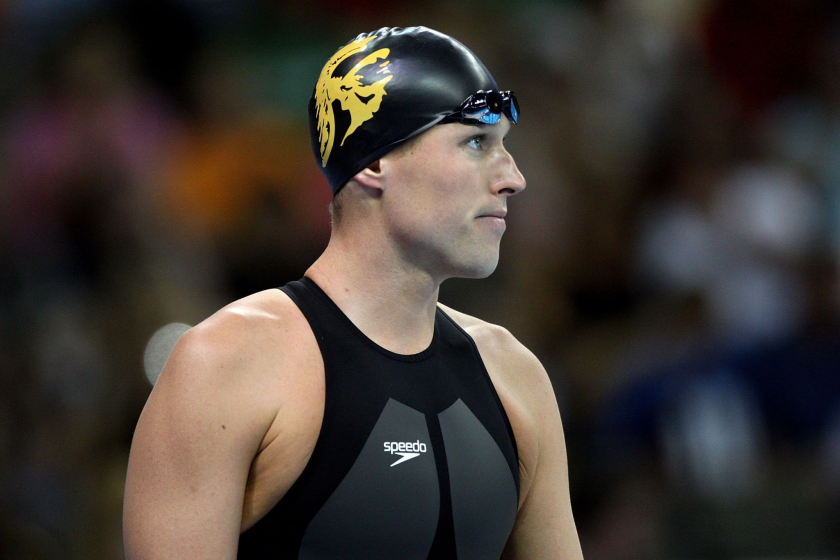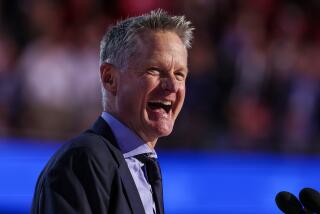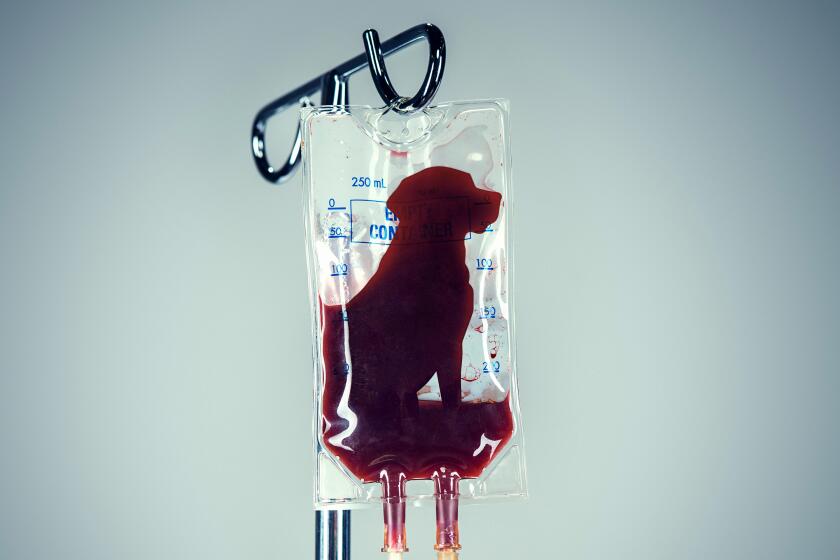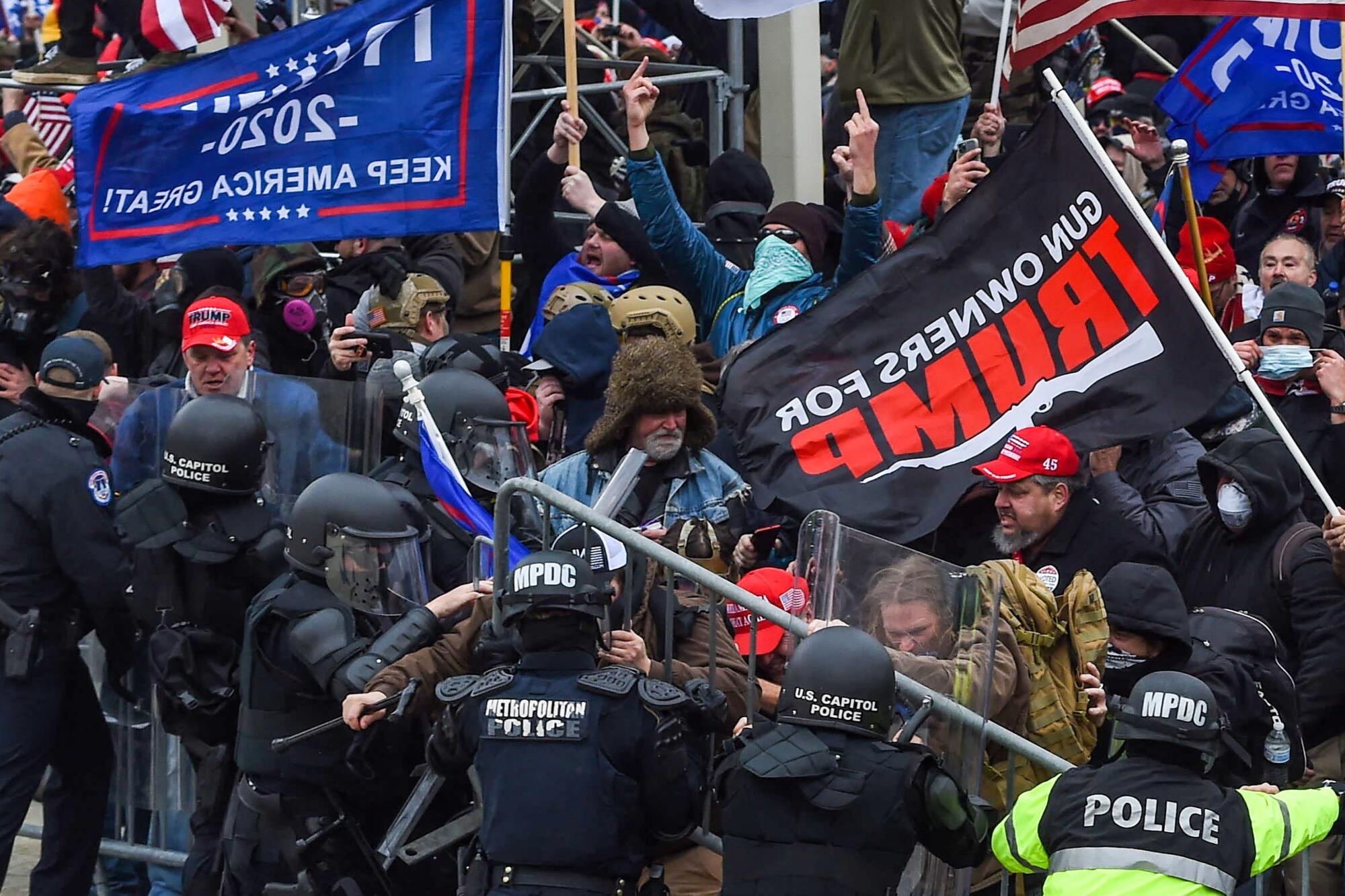
As the mob jostled with two dozen police officers in helmets and gas masks blocking a hallway to the Senate chamber in the U.S. Capitol, a voice boomed above the din.
“F— Nancy Pelosi!”
“F— Chuck Schumer!”
The shouts came from a man who in some ways resembled the other rioters — black beanie embroidered with President Trump’s name, dark sunglasses and a teal handkerchief pulled over his beard.
But Klete Keller, standing 6 feet 6, towered over the roiling sea of people. He wore a navy blue coat with “USA” emblazoned on the back in large white letters and the U.S. Olympic logo on the front that had been issued to athletes competing for Team USA. Internet sleuths and law enforcement took weeks or months to identify the bulk of more than 700 people charged in the Jan. 6, 2021, attack, but the jacket gave Keller away almost immediately.
The USC graduate had been among the world’s elite freestyle swimmers in the 2000s, competing in three Olympics and winning two gold medals. Friends and fellow swimmers knew him as easygoing and likable. Now they were mystified. Why had someone who spent much of his life representing his country joined the mob to attack a defining symbol of American democracy?
“That’s what has made this so confusing, so frustrating for so many people,” said Gary Hall Jr., the 10-time Olympic swimming medalist who has known Keller for more than two decades. “It seems so far outside of his character, his personality to get wrapped up in this.”
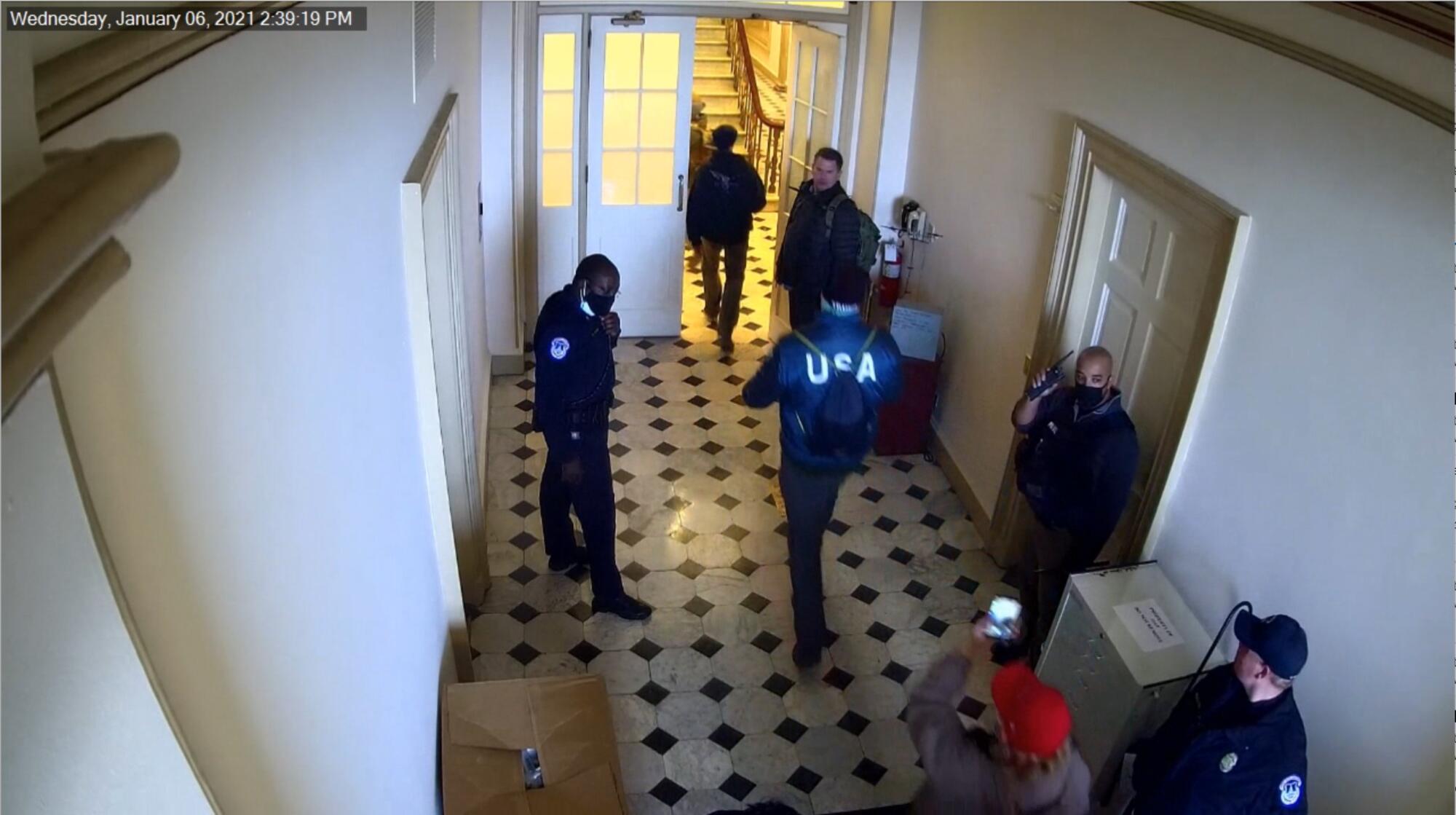
Keller, 39, has pleaded guilty to a felony charge of obstructing an official proceeding before Congress and agreed to cooperate with the government’s investigation.
The prominent role played by far-right groups like the Three Percenters, Proud Boys and Oath Keepers in the attack has captured much of the public’s attention. But most of those charged, like Keller, weren’t members of extremist organizations. They held middle-class jobs. Their average age was 39, according to George Washington University’s Program on Extremism. The vast majority — 87% — were men. They came from 45 states and the District of Columbia. They carried a deep sense of grievance.
Hundreds of pages of court records, emails and interviews with more than 30 friends, teammates and associates show that Keller’s journey to the Capitol was the latest and most bewildering choice in a life beset by struggles since retiring from swimming more than a decade ago. A revolving series of jobs. Divorce. Living in his car for 10 months. A bitter child custody dispute. Allegations of erratic behavior.
His ex-wife testified in a child custody trial in October 2020 that he had attempted suicide and, after they separated, pinned her against a wall and asked whether she had “ever heard of marital rape.” Keller denied the allegation in a court filing. He described himself during the trial as “overwhelmed” and “lost” in the years after his career ended. The belonging and identity he found while swimming eluded him on dry land.
In a statement, Keller’s criminal defense attorney, Edward B. MacMahon Jr., denied the allegations by Keller’s ex-wife as “one-sided and self-serving pleadings and statements.” He noted that Keller is allowed to have unsupervised visits with his children and said he “is doing everything he can to be part of their life.”
“Mr. Keller has admitted that he made a huge mistake by entering the Capitol,” the attorney said. “He has accepted full responsibility for his actions that day and continues to work to rebuild his life and make amends for that error in judgment.”
Keller didn’t respond to requests for comment and hasn’t spoken publicly about the attack.
In recent years, he settled in Colorado Springs, Colo., dived into a real estate career and got engaged. Some friends noticed a growing politicization and an unusually aggressive tone on social media in the months before last Jan. 6.
“He definitely fell in with the wrong crowd, but I would use that more if my teenager started making bad choices,” said Daniel Soteres, a doctor who befriended Keller. “There’s something darker about what happened with Klete.”
::
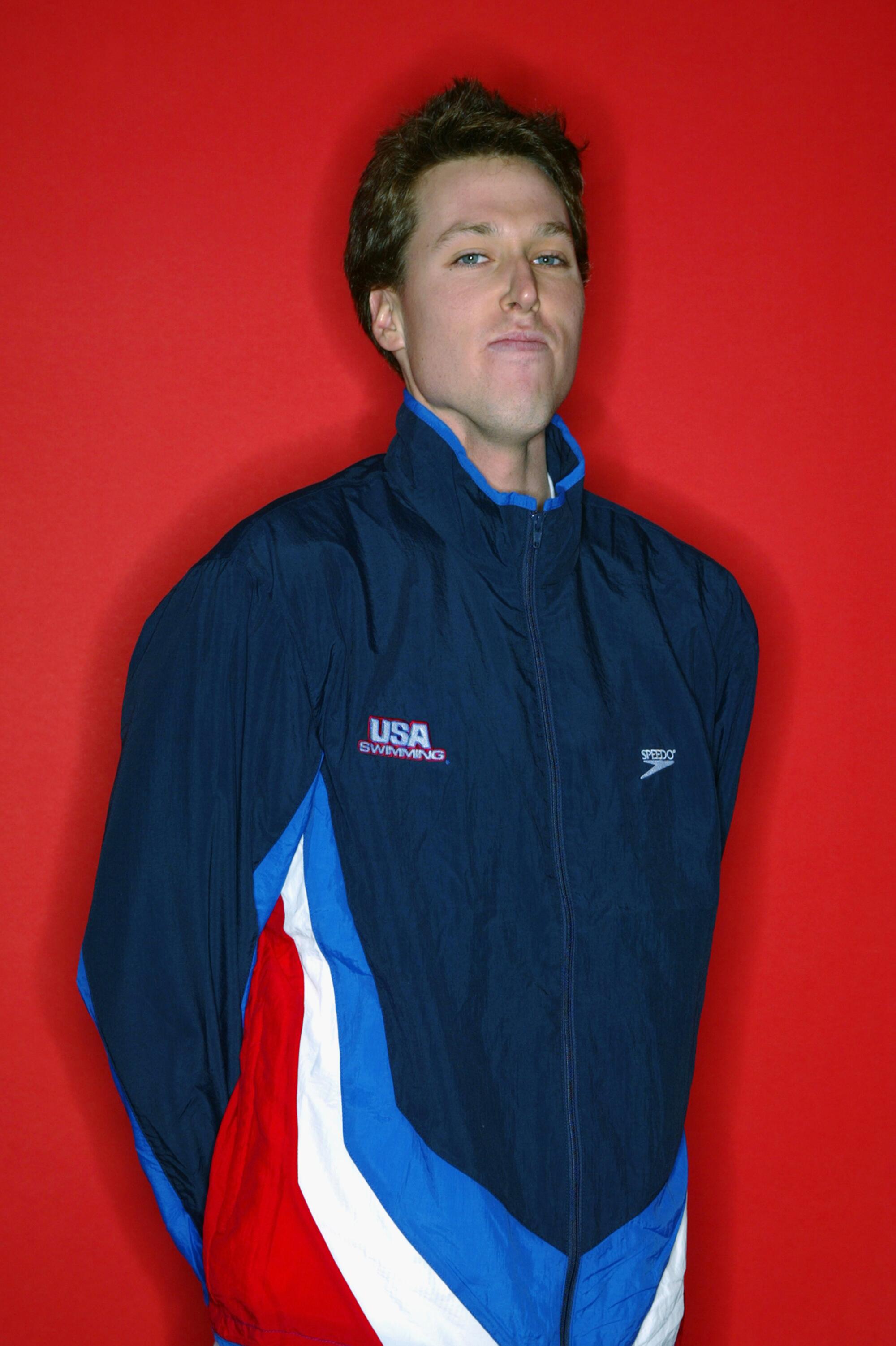
In summer 2000, Keller had just graduated from high school when he twice broke the American record in the 400-meter freestyle that had stood for 12 years and won a bronze medal in the event at the Sydney Olympics, plus a relay silver.
The 18-year-old’s quirks outside the pool attracted attention too. The Times called him a “space cadet” because of his penchant for landing in odd situations — like tumbling into the SeaWorld walrus pit as a child and getting locked inside a zoo after hours.
At USC, Keller captured three individual NCAA titles, then dropped out in 2002, later citing workouts that weren’t his style and sleeping through classes. He signed an endorsement contract with Speedo and moved to Ann Arbor, Mich., to train under legendary University of Michigan coach Jon Urbanchek at Club Wolverine. Young phenom Michael Phelps soon joined the group.
In a sport built around grinding out tens of thousands of yards in the pool each week, Keller’s happy-go-lucky approach stood out. Urbanchek called him “God’s gift to swimming.” Dan Ketchum, who swam and shared a house with Keller, remembered a flawless stroke.
‘He definitely fell in with the wrong crowd, but I would use that more if my teenager started making bad choices. There’s something darker about what happened with Klete.’
— Daniel Soteres, a doctor who befriended Klete Keller
Outside the pool, he lazed away hours watching television programs like “The O’Reilly Factor.” He quipped in an interview at the time that his “life’s passion” was “just sitting and observing.” Urbanchek rang Ketchum several times each week to locate Keller or remind him about a practice time (he was often late) or make sure he didn’t forget something (he misplaced fundamentals like swimsuits or his passport).
Keller drove an old police car, shoveled horse manure at Urbanchek’s barn and shot trap and skeet. He gave big hugs and knew how to make people laugh.
No one who encountered Keller in those years recalled politics playing a pivotal role in his life. Some said he leaned right, but that was it. Swimming overwhelmed everything. But there were hints of trouble.
Urbanchek, who became a father figure to the young swimmer, said Keller had a strained relationship with his family. The coach recalled dining with Keller and his parents, Kelly and Karen, at their Phoenix home in December 1999 when Urbanchek pitched Keller on swimming for Michigan. The coach was staggered, he said, when “the mother pulls me over to the side and said, ‘Jon, don’t waste your money. He’s never going to make it through college.’”
Keller joined USC instead, but regularly mentioned family struggles to friends and teammates. Tom Malchow, the former world record holder in the 200-meter butterfly who swam with Keller at Club Wolverine, said, “I think he always felt like ... whatever he did was not good enough for them.”
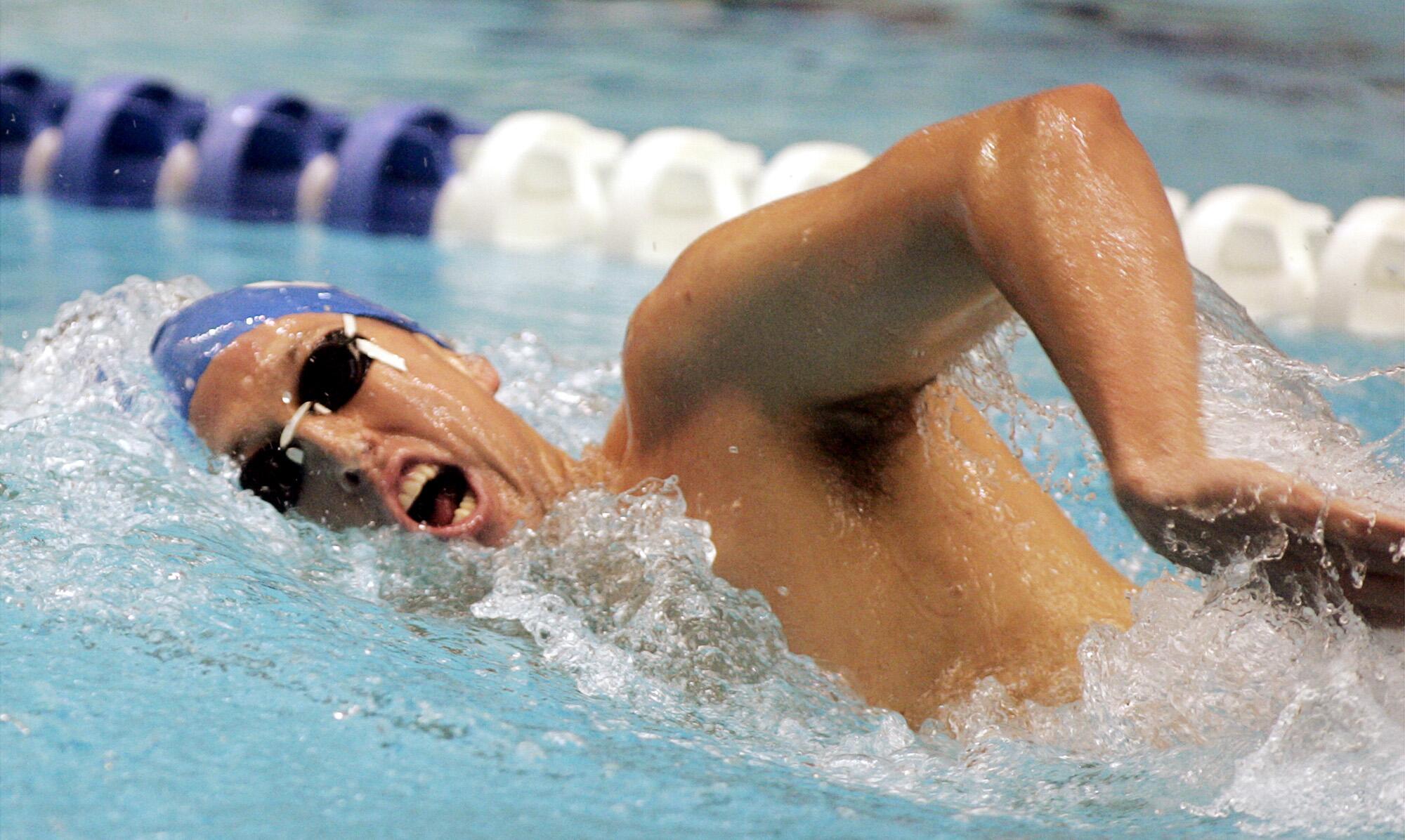
In a series of messages to The Times, Kelly Keller said, “We as parents have been the villains in Klete’s life for years and that is why we have remained out of his life.” The father denied his son had a difficult childhood and said he and his wife gave their three children “nothing but support and love all of their lives.”
Klete Keller’s sister Kelsey swam for the University of Washington, and his younger sister, Kalyn, competed for USC and represented the U.S. at the Athens Olympics in 2004.
“We support Klete going to the Capitol and showing his passion and patriotism for our wonderful country,” Kelly Keller continued. “He did not damage anything or hurt anyone there. They have made him the FACE of the Capitol Event because of who he is.”
Malchow recalled other problems before the Athens Olympics. Klete Keller suffered from insomnia, Malchow said. There were times he didn’t attend practice or, if he showed up, Malchow said, “I don’t want to use the word volatile, but he was definitely not the happy-go-lucky kind of team clown. ... It was a different side of him than we were used to seeing.”
That wasn’t in evidence in Athens, where Keller faced a daunting challenge in the 800-meter freestyle relay. Australia hadn’t lost the race in seven years, and Ian Thorpe anchored the team. The superstar owned the world record in the 200 freestyle.
Phelps, Ryan Lochte and Peter Vanderkaay swam the first three legs for the U.S. to give Keller a 1.5-second lead in the final 200 meters.
Thorpe quickly pulled even with Keller. The American didn’t falter. He matched Thorpe stroke for stroke and touched the wall an instant ahead to win by 0.13 of a second.
Afterward, Phelps called the race “one of the greatest in history,” while Keller said it felt “like you’re in another world, it’s an out-of-body experience.” He joined his teammates on the podium in Team USA jackets.
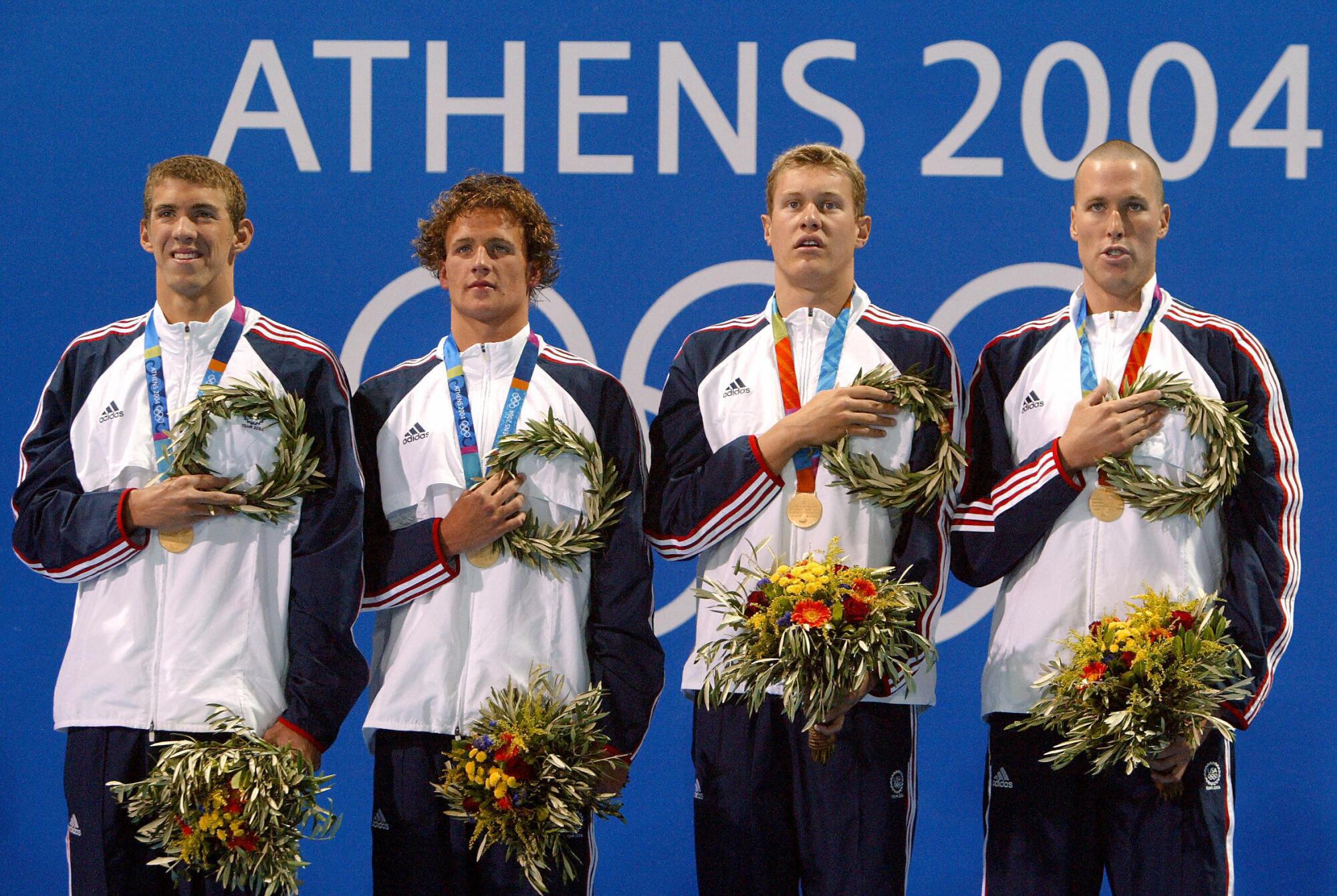
But difficulties continued away from the pool.
Cari Sherrill, Keller’s ex-wife, recalled an episode when he tried to exit her car while they were driving on a freeway. He believed taxis were chasing them. She said Keller visited hospital emergency rooms twice while they were dating, including after the freeway incident, for mental health reasons.
When Sherrill raised her worries about her boyfriend’s behavior with coaches, she said, they blamed the stress of being a professional athlete.
In early 2007, Keller returned to USC to train with the Trojan Swim Club and finish his degree in public policy and real estate development. He won another gold medal in the 800-meter freestyle relay at the Beijing Olympics the following year.
He married Sherrill a month later — Urbanchek was one of the groomsmen — and started life in the real world.
::
Two years later, on Halloween in 2010, Sherrill took the couple’s daughter, then 10 months old, to urgent care to get stitches on her chin. Pregnant with twin boys, Sherrill learned during the visit that the family no longer had health insurance.
“I found out that Klete actually didn’t have a job,” she told the court during the child custody trial. “He had been lying to me and driving around” as if going to work.
About a month after learning they didn’t have insurance, Sherrill testified, Keller told her he attempted suicide, though she added he now denies it happened.
“He came home with his face purple in color and he was crying,” Sherrill told the court. “He showed me the funnel and the tube he had bought from the store to hook to his car exhaust. Then he [had] hooked it up and sat there for a few minutes with it on, then the noise of the car scared him and he turned it off. He came home and told me that story and that he really needed help.”
Keller had taken out a life insurance policy that he said covered suicide, Sherrill testified, and told her “that was his last resort because … he couldn’t keep a job.”
Though athletes often struggle for direction after their competition days end, Keller said in a 2018 interview with the Olympic Channel podcast that he hadn’t been worried about his transition.
“All those years of success I had with swimming really gave me an inaccurate expectation of the world. It was much harder to cope with the little mini-failures I would experience on any given day,” he said. “I wasn’t a good employee or worker for the longest time because I expected it all to come to me as easily as swimming did.
Former USC swimmer Klete Keller, who won five Olympic medals for the U.S., has been charged in connection with participation in the Capitol riot.
“I had talked to my mentors and they had said, ‘Listen, you’re going to have no problem going in and immediately making six figures right out of the gate. Everybody’s going to want to hire you.’ … When those things didn’t happen, it really affected my outlook.”
He described himself as having been “a real lazy, spoiled, entitled person.”
When Keller took the stand during the custody trial, he said he had to “basically figure out who I was” after swimming and didn’t have anyone with whom he could discuss his “concerns or fears” about living in the real world.
“It was very overwhelming to have three kids in diapers and also needing to support them,” Keller testified, “and that kind of led to some confusion on my part. I was lost.”
During the custody trial, Sherrill estimated that Keller had held 15 to 17 jobs. His employers included a securities firm that touted his Olympic medals in an advertisement and a national financial services company. Keller said in the podcast he was fired from the latter job the day after the couple legally separated on Jan. 28, 2014. He didn’t give the reason.
The churn of jobs continued in the following years: a swim school, construction company, ride-sharing service, an account executive with a national real estate company and swim clinics.
“He was not able to adjust from having everyone cater to him and do things for him to having to do them for himself,” Sherrill said.
She told The Times that Keller spent much of their relationship blaming his parents for problems during his upbringing. The parents have never met his three children, according to court records. Eventually, she said, his resentment focused on her.
In an email Sherrill sent Keller five days after their separation that was entered as an exhibit in the custody case, she wrote: “You have to get help. Did you know your work called me to discuss your mental status and your dad and your grandma? Hello? ... Blaming me isn’t going to help you see the kids. Getting help will.”
Keller responded: “What’s not fair is you keeping them from me and not allowing me to see them or even talk to them. They’re not bargaining chips, they’re children.”
Sherrill testified Keller entered her home late one night shortly after the separation.
“He was standing behind me in my bathroom. It scared me fairly bad,” she testified. “I ended up talking him to the top of my stairway because he wouldn’t leave. … He pinned me up against my sons’ bedroom door and said, ‘Have you ever heard of marital rape?’ It caused something of a physical shoving match and then I threatened to call the police, so he left.”
Keller wasn’t questioned about the accusation during the trial.
Neighbors alerted Sherrill several times when they spotted Keller outside her home. In court filings, Sherrill accused him of stalking her. At the trial, Keller’s attorney asked whether she had summoned police.
“No,” Sherrill testified. “I slept with a gun in my bed instead.”
::
Following the separation, Keller’s life turned nomadic. He lived with his sister Kalyn and her husband in Maryland for six or seven months, then relocated to Southern California at his grandmother’s home in Running Springs. He appeared with other Olympians at a handful of swim clinics across the country, but didn’t have a full-time job. After clinics, participants posed for pictures with Keller and his gold medal from Beijing.
In an interview with NBC’s Olympic Talk blog in spring 2014, Keller sounded conflicted about his years of swimming: “I should have put a lot more time into thinking about careers and what I was doing after swimming. … I still probably hold some bitterness toward myself mostly, but also a little bit toward my sport because I let myself get too deep into it. I’m still not quite over that, unfortunately, but I’m working on it.”
Sherrill sued Keller for child support in Mecklenburg County District Court in North Carolina and, that September, Judge Christy T. Mann ordered him to pay $191 a month and get a full-time job. The judge wrote: “Defendant’s underemployment is voluntary and is a result of Defendant’s naive indifference to his children’s immediate financial needs.”
‘We support Klete going to the Capitol and showing his passion and patriotism for our wonderful country. He did not damage anything or hurt anyone there. They have made him the FACE of the Capitol Event because of who he is.’
— Kelly Keller, father of Klete Keller, in a message to The Times
Keller moved to North Carolina that October and testified later that he lived in his Ford Fusion because the child support obligation made it impossible to pay the first and last months’ rent for an apartment. He slept in Walmart parking lots and maintained a gym membership to shower.
The following month, according to court records, Keller told the judge that he was “mentally and physically incapable of working” and struggled with depression.
Acting as his own attorney, Keller filed two court actions alleging Sherrill refused to allow contact and visitation with the children. Both were dismissed for procedural defects. The children called him “Uncle Klete” or “Mr. Klete.”
“I’m not going away and you’re not going to push me out of their lives,” Keller wrote in an email to Sherrill in mid-2015.
Sherrill, who had remarried, listed concerns about her ex-husband in an email later that year to a therapist who worked with the family: “Emotional stability. Crying, yelling, being sarcastic, calling kids names, saying inappropriate things to kids, at kids or about me. ... Bizarre and unpredictable behavior towards me, at me or in the presence of me at every interaction within the last two years.”
When Keller returned to court in late 2016 for a child support trial, the judge seemed exasperated. Mann wrote that, once again, swim clinics were Keller’s only employment. She said she hoped he would “grow up,” but he had “failed to rise to the occasion” and was “old enough to know better.” He was 34.
A year later, in fall 2017, Keller abruptly moved to Colorado Springs without a job. When he later explained the reason for relocating, he cited frustration with the custody situation — he had sued Sherrill for joint custody — and a long-standing affinity for the area from his days at the Olympic training center in the city.
Keller got his real estate license, spent nine months at a residential real estate firm, then moved to another. Colleagues recalled a quiet, personable co-worker with an easy smile who enjoyed mountain biking and hiking and didn’t hide his post-swimming difficulties. Conversations often turned to his children.
He posted glowing Facebook messages about life in Colorado. USA Swimming published an upbeat story about him. On the surface, he appeared to have turned a corner.
::
Though Keller registered as a Libertarian in North Carolina, he didn’t affiliate with a party when registering to vote in Colorado in late 2017. He didn’t usually talk politics. As the pandemic intensified in 2020, friends noticed his social media posts opposed public health interventions such as masks and supported Trump. Some said his online presence seemed aggressive and at odds with the low-key person who raised chickens in the yard of the house he shared with his girlfriend.
Soteres, the Colorado Springs doctor, teamed with Keller on two relays at a masters swim meet in March 2020. He said Keller’s affable, laid-back personality made him easy to get along with. But Soteres noticed he was bothered by pandemic-related restrictions and believed his friend entered a “social media wormhole” and perhaps felt “the system alienated him, maybe stole his children from him.”
“I think that he got to a darker and darker place within that sort of vacuum,” Soteres said.
He recalled offering a counterpoint to one of Keller’s posts. Keller, he said, responded with a direct message threatening to block his friend if he posted another response.
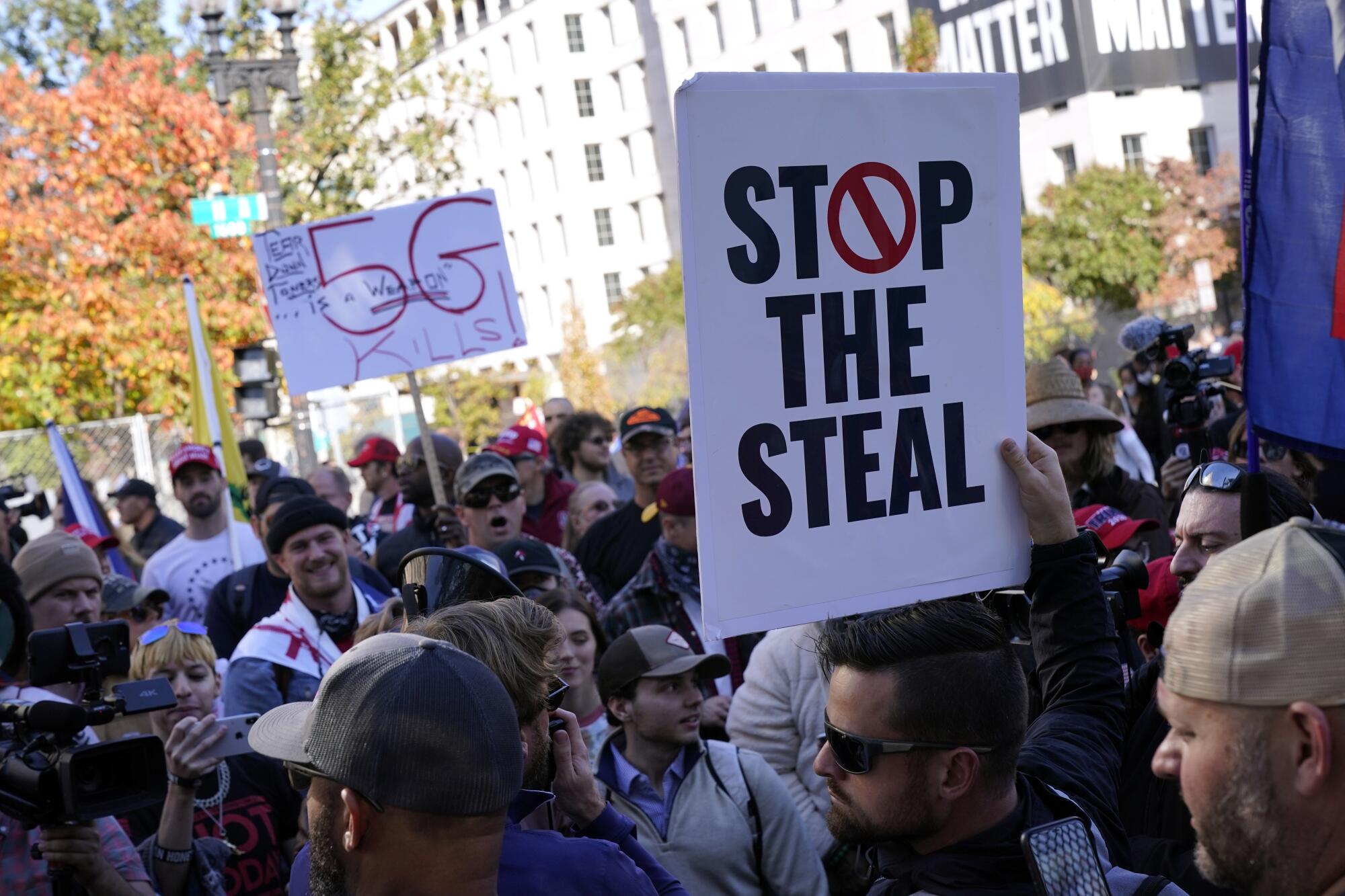
Several friends remembered another post by Keller — one person called it a diatribe, another a rant — describing a run-in at a supermarket where he alleged a person confronted him for not wearing a mask or walking the wrong way down a one-way aisle and followed him home.
Keller missed a scheduled weekend visit with his twin boys in North Carolina in March, according to court records. The judge in the custody case wrote: “He blamed it on the weather but told the kids he had to work. His flight was not cancelled.” Sherrill alleged in court filings and testimony that Keller had missed or been late for several visits.
When Keller learned the twins had started meeting with therapists, he fired off an email to Sherrill: “What a joke.” He expressed alarm that one of them might be put on medication “for any disorder these quacks might think he has.” No medication had been suggested, Sherrill testified.
Early that August, according to court records, Keller took his 9-year-old twins through the Virginia Creeper Trail in southwestern Virginia and “allowed the boys to shoot at road signs with a BB gun from the window of a moving vehicle.” Questioned about the episode during the custody trial, Keller said, “There was no one on the road and I thought it would be a fun thing to do.”
Later that month, Keller attended a fundraiser for then-U.S. Sen. Cory Gardner (R-Colo.) at the Colorado Springs home of Eli Bremer, who competed in the modern pentathlon in the Beijing Olympics. Bremer once suggested Keller run for office; he thought maybe he could be a county commissioner. Active in Republican politics in Colorado, Bremer didn’t see a well-developed set of political views in Keller and described his approach as “very passive.”
“If you said what’s one issue that could really light him on fire, it would be his kids,” Bremer said.
When Keller testified at the child custody trial, his tone was different than in the 2018 podcast where he sounded remorseful for post-swimming choices and described himself as having become “a whiny baby.” He recast himself as a victim of his ex-wife, described past problems as “bumps in the road” and wished he would’ve gone to court sooner to seek “my rights as a father.” He compared not being able to see his children to being imprisoned.
“Anything good about me has been stripped away and a narrative has been spun that paints me in an extremely bad light and kind of puts fear in their hearts a little bit toward me until we get together and spend time together and it melts away,” Keller testified.
Two weeks later, Iredell County Judge Christine Underwood awarded sole legal custody of the twins to Sherrill along with temporary sole legal custody of their then-10-year-old daughter. In her order, the judge wrote that Keller “steadfastly denies he has any mental health conditions despite years of housing and employment instability, and despite a previous suicide attempt.”
In the months since the deadly attack, election denialism has grown, paving the way for future efforts to violently overturn elections.
He was “the epitome of a ‘fun’ dad,” she added, but also “very much acts like a kid himself.” She found that Sherrill had been an “excellent mother” and that Keller is a “fit and proper person to have visitation and contact with the minor children, given certain parameters.”
In mid-November 2020, Keller flew to Washington with his girlfriend for the “Million MAGA March” protesting the presidential election outcome. Wire service photos captured him waving a Colorado flag amid thousands of pro-Trump protesters.
“I think he felt like because he couldn’t be involved in his kids’ life on a daily basis that maybe he could have a positive impact for his kids by having a cause and really being faithful to that cause,” said Holly Trinidad, managing broker at Hoff & Leigh, the commercial real estate firm in Colorado Springs that Keller joined in summer 2020. “Probably the underlying psychology behind that was doing something to better the future for his kids, which really comes from a place of love.”
On Dec. 18, 2020, the Iredell County Sheriff’s Office responded to a call at 7:26 p.m. for “custody issues” at Sherrill’s home in Davidson, N.C. A court filing by Sherrill’s attorney described Keller arriving for a scheduled visit with the twins and becoming furious when one of the boys resisted leaving.
“[Keller] angrily said numerous ugly, demeaning, and threatening things to [Sherrill] and her husband,” the filing said.
It alleged that Keller “continued his verbal attacks on [Sherrill] and her family throughout the weekend, and when [the twins] defended [Sherrill] and her family, [Keller] became enraged and told [the twins] that he might not come visit them anymore, and it was their fault.”
Sixteen days after the visit, Keller flew to Washington.
::

Wearing the Team USA jacket issued to U.S. Olympians at the Pyeongchang Winter Games in 2018 — it’s unclear how Keller acquired it — he listened near the Washington Monument on Jan. 6 as Trump addressed tens of thousands of supporters.
Shortly after 2 p.m., as Congress met to certify Joe Biden’s election as president, numerous photos and videos captured Keller among the mob pressing toward police in front of scaffolding erected for Inauguration Day on the west side of the Capitol. Keller quickly worked his way within a few feet of the front line as police tried to hold back the mass of people with pepper spray, metal barricades and tear gas grenades. A photo showed Keller extending both middle fingers.
At 2:39 p.m., surveillance video captured Keller holding his phone as he strode into the Capitol through the Upper West Terrace doors. In his statement of offense, Keller acknowledged, “I know that I did not have permission to enter the building” and “I believed that I and others were trying to obstruct, influence, and impede” Congress certifying the election.
Keller passed through the Rotunda and joined the confrontation between rioters and police in the long hallway leading to the Senate chamber. Police drove back the mob with streams of pepper spray.
Eleven minutes after Keller returned to the Rotunda, police started clearing the packed room. Amid a scene that resembled a mosh pit, Keller jerked his elbow to shake off officers, according to his written admission filed in court.
After being shoved out of the Rotunda, Keller lingered near the statues of War and Peace. He clapped his hands, took photos of police trying to eject the mob, and appeared to laugh in surveillance video footage as rioters surged into the room through the east Rotunda doors. At 3:27 p.m., Keller was driven out of the Capitol, still holding his phone in the air.
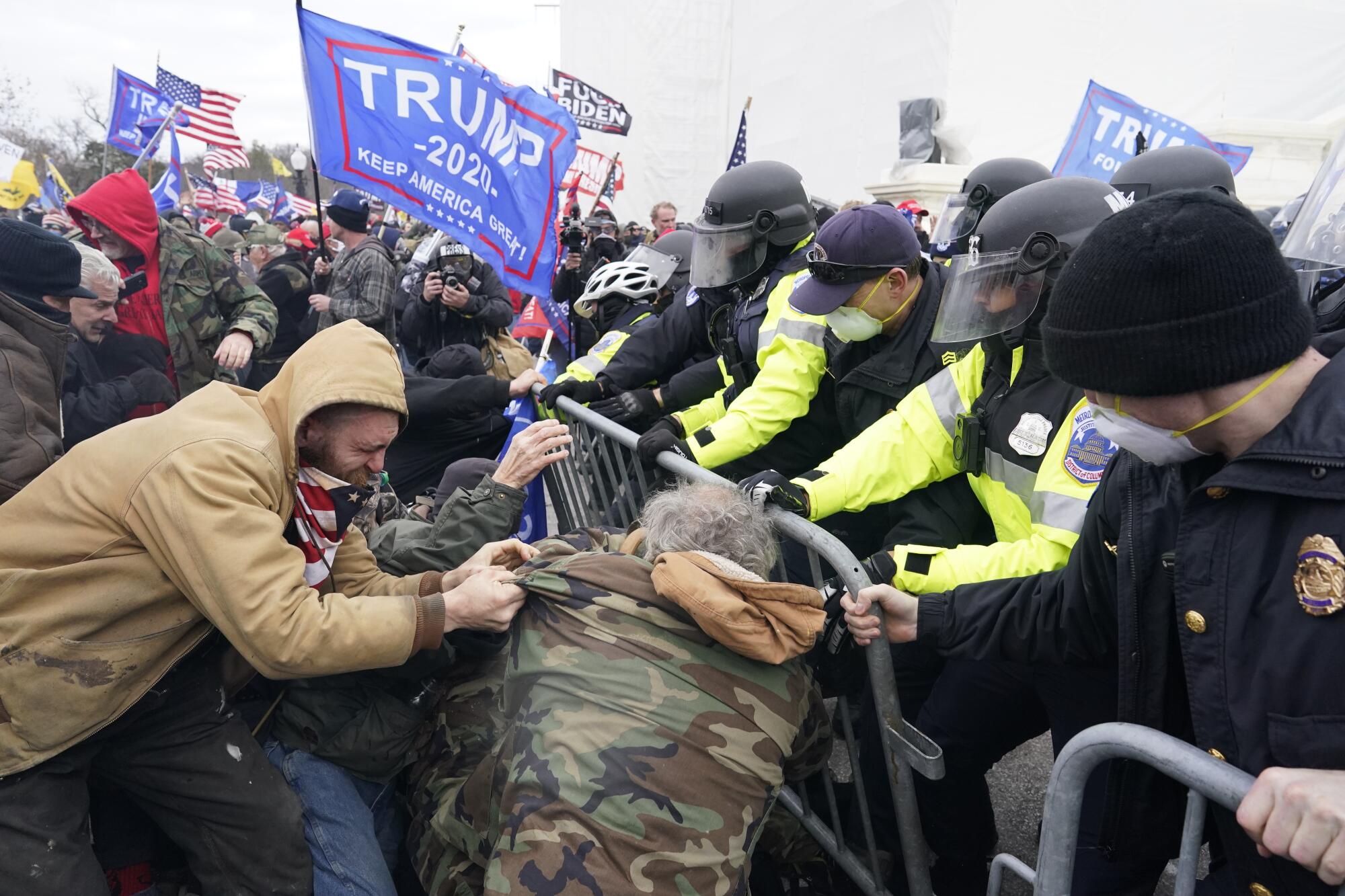
During the next 24 hours, according to court records, Keller destroyed his phone and memory card. Deleted social media accounts. Threw away the Team USA jacket.
Five days after the attack, a swimming website, SwimSwam, published the first story linking Keller to the riot. Hoff & Leigh issued a statement the next day that Keller had resigned, saying, “We cannot condone actions that violate the rule of law.” His biography vanished from the company’s website.
On Jan. 13, Keller was charged in U.S. District Court in Washington. The criminal complaint included screenshots of Keller wearing the jacket.
That day, Urbanchek called Keller’s participation a “stupid move,” but defended him as a “very patriotic guy” who wore the Team USA jacket “to show respect for our country” like he had on medal stands at the Olympics.
“He doesn’t look like any of the other people who were really pounding and breaking things,” Urbanchek continued. “I would not put him on the same level. … They haven’t done s— for America. He’s a strong American. … Klete was about as American as anybody can be. Maybe he was too American.”
A grand jury indicted Keller on seven counts. Citing the Capitol attack and the December incident in North Carolina, Sherrill filed a motion to reduce his visits with the twins.
In May, according to Colorado real estate licensing records, Keller resumed working for Hoff & Leigh.
“He was completely remorseful,” Trinidad said of Keller in the days and weeks after the attack. “He was like, ‘I should have never gone. Had I known what this was going to turn out to be, I would never have gone and never have done this.’ … He’s genuinely a good-hearted person and you can’t have enough people in your life that are truly good-hearted people, regardless of how you feel about their politics.”
Urbanchek said during an interview in June that Keller was apologetic, wanted to turn his life around and remained “very confident” he’d get out of the charges with a fine.
But many of those who know Keller remain puzzled by his involvement.
“He was struggling with identity and hard times,” said Hall, the Olympic medalist. “That’s what these radicals prey upon. He got swept up in it.”
Soteres put it bluntly: “This is a guy who has been given more second chances than most people get first chances.”
As part of a deal with prosecutors, Keller pleaded guilty Sept. 29 to a felony count of obstructing Congress. He won’t be sentenced until his cooperation with the government is finished. But he faces much more than a fine. Sentencing guidelines call for 21 to 27 months in federal prison.
The twins are “completely resistant to any form of contact” with Keller in the aftermath of the Capitol attack, according to a motion filed by Sherrill’s attorney in the custody case in late 2021, and he hadn’t visited them in almost a year.
On Oct. 28, Keller joined hundreds of commercial real estate agents attending a charity boxing event in Arvada, Colo. He wore a suit, clutched a drink and grinned as he posed for a picture with two colleagues amid the celebration.
Keller’s biography returned to Hoff & Leigh’s website the same week. It mentioned his love of skiing and hot springs, his work ethic and drive, his three Olympics and two gold medals, his epic race against Thorpe.
More to Read
Sign up for Essential California
The most important California stories and recommendations in your inbox every morning.
You may occasionally receive promotional content from the Los Angeles Times.
